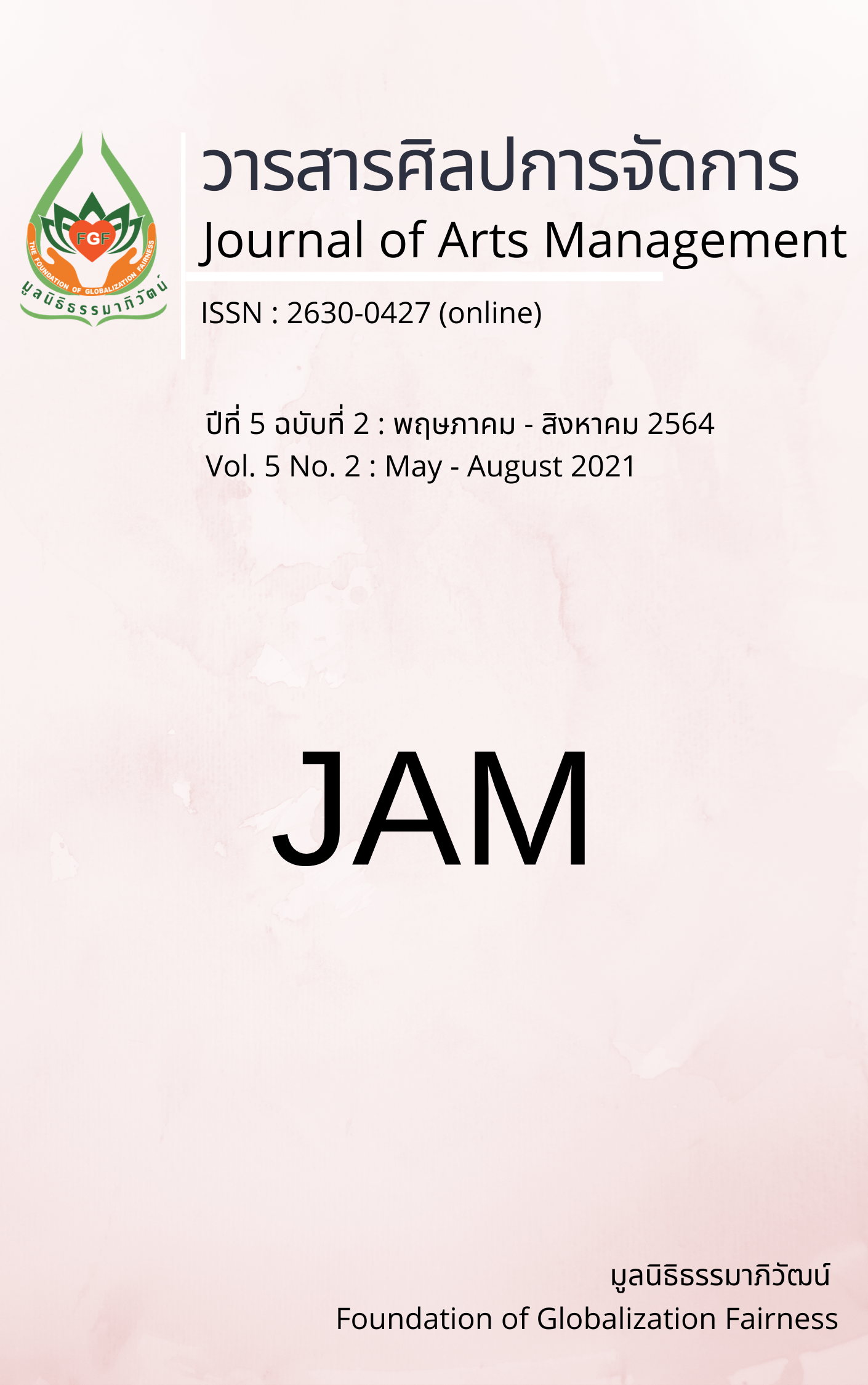A Study of the Relationship between School Administrators' Leadership Behavior and Resource Mobilization of Secondary Schools under the Office of the Basic Education Commission
Main Article Content
Abstract
This research aimed to study 1) the leadership of the administrators of the secondary school under the Office of the Basic Education Commission 2) Mobilization of resources of Secondary Schools under the Office of the Basic Education Commission and 3) Relationship of executive leadership and Mobilization of resources of secondary schools under the Office of the Basic Education Commission. Using the school as an analytical unit. The sample group consisted of 302 schools, 3 persons per school are 1 The School Director/Represent the School Director, 1 Deputy School Director and 1 Teacher, totaling 906 people. The research tool was a questionnaire about the leadership of the administrators on the according to the concept of Sergiovanni. And resource mobilization under the National Education Act B.E. 2542 Amendment (No. 4) B.E. 2562. Data analysis using a package software. The statistics used in data analysis were frequency, percentage, arithmetic mean. Standard deviation Hypothesis testing. Using Pearson's Correlation Coefficient Analysis was used. The results of the research were as follows:
1. Leadership of the High School Administrators under the Office of the Basic Education Commission. The overall and the aspects are at a high level. In descending order: Purpose, flexibility, work principles, people management, foresight, principles and affection, organization, basic necessity planning. And the principle of governing, respectively
2. Resource Mobilization of Secondary Schools Under the Office of the Basic Education Commission The overall picture is at a high level. When considering each aspect, at the highest level in descending order: Law, Faith, Motivation, Public Relations. Participation And resource management, respectively
3. The leadership of the administrators was related to the resource mobilization of the secondary schools. Under the Office of the Basic Education Commission the overall relationship was statistically significant at the .01 level.
Article Details
Views and opinions appearing in articles in the Journal of Arts of Management It is the responsibility of the author of the article. and does not constitute the view and responsibility of the editorial team I agree that the article is copyright of the Arts and Management Journal.
References
กระทรวงศึกษาธิการ. (2562). พระราชบัญญัติการศึกษาแห่งชาติ พ.ศ. 2542 ฉบับแก้ไขเพิ่มเติม (ฉบับที่ 4) พ.ศ. 2562. กรุงเทพฯ: พริกหวานกราฟฟิค.
จุมพล โพธิสุวรรณ. (2564). พฤติกรรมผู้นำเชิงยุทธศาสตร์. วารสารสหวิทยาการมนุษยศาสตร์และสังคมศาสตร์, 4(1), 135-148.
ณัฐวรรณ ฐิตาคม. (2556). การประยุกต์ใช้พรหมวิหาร4ในการบริหารงานของผู้บริหารสถานศึกษาสำนักงานเขตพื้นที่การศึกษามัธยมศึกษาเขต 42(วิทยานิพนธ์พุทธศาสตรมหาบัณฑิต). มหาวิทยาลัยมหาจุฬาลงกรณราชวิทยาลัย.
ดวงแข สุขประเสริฐ และ ปิยะนาถ บุญมีพิพิธ. (2563). ภาวะผู้นำของผู้บริหารที่ส่งผลต่อการประกันคุณภาพภายในสถานศึกษา สังกัดสำนักงานเขตพื้นที่การศึกษาประถมศึกษาสุพรรณบุรี เขต 3. วารสารวิชาการ สถาบันเทคโนโลยีแห่งสุวรรณภูมิ, 6(2), 496-511.
ธีรศักดิ์ อุ่นอารมณ์เลิศ. (2558). วิธีวิทยาศาสตร์การวิจัยทางสังคมศาสตร์. (พิมพ์ครั้งที่ 2). นครปฐม: โรงพิมพ์มหาวิทยาลัยศิลปากร.
บุญพา พรหมณะ. (2559). ภาวะผู้นำทางวิชาการของผู้บริหารสถานศึกษาสังกัดสำนักงานเขตพื้นที่การศึกษาประถมศึกษาสุราษฎร์ธานี เขต 1(วิทยานิพนธ์ครุศาสตรมหาบัณฑิต). มหาวิทยาลัยราชภัฏนครศรีธรรมราช.
ปัณฑารัด บุญอนันต์. (2553). คุณลักษณะผู้นําของกรรมการชุมชนมาบสอง-ค่ายมวย เขตเทศบาลเมืองหนองปรือ จังหวัดชลบุรี กับภาวะผู้นําแบบมีส่วนร่วม(สารนิพนธ์ปริญญามหาบัณฑิต). มหาวิทยาลัยธรรมศาสตร์.
พิณสุดา สิริธรังศรี. (2561). การระดมทรัพยากรเพื่อการศึกษา. กรุงเทพฯ: มหาวิทยาลัยธุรกิจบัณฑิตย์.
ไพฑูรย์ สินลารัตน์. (2553). ผู้นำเชิงสร้างสรรค์และผลิตภาพ: กระบวนทัศน์ใหม่และผู้นำใหม่ทางการศึกษา. กรุงเทพฯ: จุฬาลงกรณ์มหาวิทยาลัย.
ราชบัณฑิตยสภา. (2558). พจนานุกรมศัพท์ศึกษาศาสตร์ร่วมสมัย ฉบับราชบัณฑิตยสภา. กรุงเทพฯ: เจี้ยฮั้ว.
สำนักงานเลขาธิการสภาการศึกษา. (2553). แผนการศึกษาแห่งชาติ ฉบับปรับปรุง (พ.ศ. 2552 - 2559). กรุงเทพฯ: สำนักงานเลขาธิการสภาการศึกษา.
Cronbach, J. L. (1984). Essentials of Psychology Test. (4th ed.). New York: Harper & Row.
Frazer, K. J. (2005). Maximizing Ethical Practices in Fundraising. Masters Abstracts International, 43(2), 414.
Hersey, P., & Kenneth H. B. (1993). Management of Organizational Behavior: Utilizing Human Resources. (6th ed.). New Jersey: Prentice Hall.
Hoy, W. K., & Cecil G, M. (2001). Educational Administration: Theory, Research and Practice. (6th ed.). New York: McGraw–Hill.
Krejcie, R. V., & Morgan D. W. (1970). Determining Sample Size for Research Activities. Education and Psychological Measurement, 30(3), 607-610.
Likert, R. (1961). New Pattern of Management. New York: McGraw-Hill.
Sergiovanni. T. J. (1982). Ten Principle of Quality Leadership. Educational Leadership, 39(5), 331-339.
Yukl, A. G. (1989). Leadership in Organization. (2nd ed.). New Jersey: Prentice Hall.


